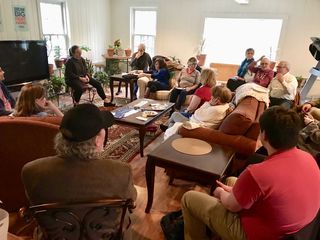Politics
Heartbreak, Hope, and Political Action
Feeling down about politics? Get off the Internet and into action.
Posted November 5, 2019

The organizer for the Warren campaign, a petite woman in her 20s, sat across from me at our dining room table, and asked: “What does your heart break for?"
Now that’s a very different way to start a conversation about which candidate I’m supporting for President. I chuckled and, perhaps a bit protectively, asked what kind of answers she’d received to that question.
“People respond,” she said, and told me that earlier in the day, canvassing door-to-door in the area, a man sitting in a truck in his driveway told her that he’d just learned that his daughter-in-law, who lives in Canada, had been visiting family in Detroit, and she’d been abruptly deported. “He broke down into tears and said he never thought he’d be living in a country that acted that way.”
The Warren organizer went on to tell me that heartbreak had been a reality in her life, and she believes that starting with heartbreak is an important way to begin a political conversation.
That resonated with me. Who does not feel heartbreak at what is happening in this country these days?
So, I tell her about the morning after the 2016 election. I was on my way to work when I got a phone call from our 30-year-old daughter, who was in tears. “How could this happen? How could such a person become our President.”
I told my daughter back then that I didn’t know, but that clearly there’s a darkness in our country, it has always had been there, and maybe now it’s better that the darkness is out in the open, so that we can deal with it. That was a hopeful answer, and I believe it, but the truth is that my heart was broken that day in 2016, too. I could have wept with her.
Heartbreak is a part of our everyday lives. Opening the morning paper is an act of courage. Or masochism, perhaps. Many of us are still bunkered down, trying to protect ourselves from the bad news that comes at us every day. Political campaigning may skip over an important step: helping people heal from the trauma of the past few years.
I remarked to the Warren organizer that maybe we needed a different kind of political event, one in which people could talk openly with each other about their sorrow and loss—their heartbreak—as a way to move toward hope and the kind of political action that stems from hope. She was game—I perceived some of the same energy, hopefulness, and enthusiasm (“let’s do that!”) that Elizabeth Warren embodies.
And so, several weeks later, I sat in the living room of our home with 25 neighbors and strangers who had responded to our invitation to spend an evening talking about “heartbreak, hope, and political action.”
Another young Warren organizer spoke first about her heartbreak. She’s from the Gulf Coast (“Hi, y’all!”) and described how much she loves fishing in the Gulf of Mexico every year with her grandfather. As a teen, she had witnessed how the BP Deepwater Horizon oil spill—the worst oil disaster in U.S. history—destroyed her grandfather’s oyster beds and his fruitless years-long struggle to get the company to take responsibility for the damage. And right now, there is an ongoing oil spill in the Gulf from uncapped wells owned by Taylor Energy that threatens to overtake the Deepwater Horizon disaster as the largest ever. Yet the current administration is proposing the expansion of U.S. oil and gas drilling.
Her heartache was palpable as she spoke of watching offshore islands she’s fished near all her life disappear under the rising water. Louisiana loses three football fields of land every day to the Gulf. Every day.
So that everyone would have a chance to tell their story, we broke up into four groups, all huddled in small circles around our living room and dining room; then, the groups reported out their stories of political heartbreak in the room.
A mother spoke tearfully of not being able to help pay off her daughter’s oppressive college debt. In fact, she’d had to give up her own health insurance because her work had fallen off recently.
That led a woman with health insurance—and several serious health issues over the past few years— to disclose how guilty she felt at not supporting Medicare-for-All out of fear of losing her excellent insurance coverage, even though she knows that many people need coverage.
Another person spoke openly about how scared they are about the climate: Will we even have a liveable Earth in 30 years?
The awful income inequity in this country came up—“One percent of the country now owns more wealth than the bottom 90 percent!”—and how painful it is to see how few people understand how great a problem this is.
Climate change, health insurance, income inequity—these issues are producing heartbreak in people’s lives. And the result is widespread despair, paralyzing rage, or a “fogginess” (as one person described it) in which you try not to pay close attention to what is happening. While understandable, these are not adaptive responses to the crisis of our times.
In the evening event, one of the strongest outcomes was surprise and relief that other people felt the same way. An energy came from this recognition. The discussion of Elizabeth Warren’s proposals had a very different tone as we recognized how they related to the heartbreak in the room
We moved on to what people could do—forms of political action within their comfort zone that reduced the sense of helplessness and heartbreak: letters to the editor, door-to-door canvassing, telephone canvassing, baking cookies for volunteers, etc. Knocking on doors, making phone calls—direct, personal voter contact—can be a powerful way to combat feelings of despair and helplessness.
A sample of 25 is a small data set, but there are some thoughts I took from the evening:
To really organize, start with the heart. We all want to feel inspired by political candidates, so we are besieged by large rallies and informational house parties and televised debates and town halls, yet the real grassroots movements that produce change may come from smaller groups that meet to talk from the heart about what really matters to them. These conversations build connections.
And more. Sorrow shrinks when it’s shared, and the feeling of connection to others can lead us to take action we might not do on our own. Beyond that, there is compassion. When we hear directly from people about shared sorrow, our empathy increases. And that may be the ground for shared action.
As Bina Venkataraman writes in her review of how to plan better to deal with the urgencies we face: “In order to motivate people to act today, we need to imagine human beings as more compassionate.” Stories honestly told build compassion.
Get off the Internet to feel empowered. We need to spend more time in face-to-face groups and less on the Internet. Surfing the web breeds isolation and a false sense of doing something. As Jill Tolentino has pointed out, “the internet reminds us on a daily basis that it is not at all rewarding to become aware of problems that you have no reasonable hope of solving.” The internet becomes a substitute for political and social engagement, in which “opinion stops being a first step toward something and starts seeming like an end in itself.”
Further, social media is not the great organizing tool we may think it is. Mass rallies and protests are easier to organize in this age of social media, but research indicates they produce limited long-term change since social media consists of “weak ties” with lower commitment. “Strong ties” come from the kinds of open-hearted discussion that I witnessed in our “heartbreak to hope” evening.
The young need the old and vice-versa. I appreciated the energy of the young Warren organizers, with their willingness to drop everything now and work for Elizabeth Warren in the hope of building a better future for us all. Their enthusiasm energies me. Yet the younger generation also needs the older generation to affirm and support the hope they are bringing to our political life.
A friend of mine, active in the 1960s, said to me when I told him about this event: “Wish I’d been there. I spend a lot of my time feeling burnt-out or just trying to find some spark in my life.” The young can provide a spark for the older folk, just as older folk can affirm and lend our wisdom to young people’s efforts to heal this broken world.
The generations need each other as we work to heal from the heartbreak of the last few years in this country.




